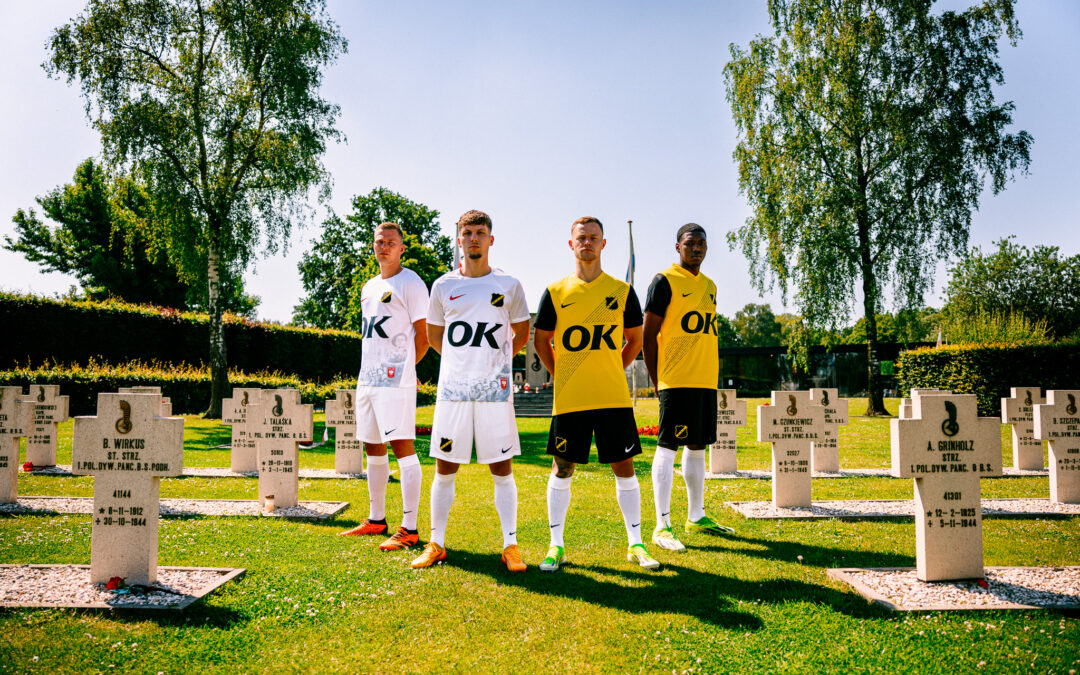Dutch football club NAC Breda has honoured the Polish soldiers who liberated their city from German occupation in 1944 by launching kits for the new season featuring photographs and names of the Poles who died fighting to free the city 80 years ago.
“On 29 October 1944, the Polish 1st Armoured Division, led by General [Stanisław] Maczek, liberated our beautiful city of Breda,” wrote the club in a statement. “Now, eighty years later, we honour these heroic warriors who never gave up and always kept going.”
✨ 𝘋𝘦𝘵𝘢𝘪𝘭𝘴 𝘵𝘩𝘶𝘪𝘴𝘴𝘩𝘪𝘳𝘵#NACpraat pic.twitter.com/gfvzYiZcEI
— NAC Breda 💛🖤 (@NACnl) June 27, 2024
To mark the Polish soldiers’ sacrifice, the club will play next season in the Dutch top flight wearing a home shirt that features the names of 40 Poles who died liberating the city. Their away kit includes photos of the liberators as well as an image of the Polish eagle.
The uniforms, which went on sale on Friday this week, were modelled by players in a war cemetery for Polish soldiers.
✨ 𝘋𝘦𝘵𝘢𝘪𝘭𝘴 𝘶𝘪𝘵𝘴𝘩𝘪𝘳𝘵#NACpraat pic.twitter.com/5arX9e0LAd
— NAC Breda 💛🖤 (@NACnl) June 27, 2024
The designs were created in collaboration with the Maczek Memorial Breda, a museum in the city dedicated to the general and his armoured division.
NAC Breda has regularly paid tribute to the role of Polish troops in freeing their city. In 2019, on the 75th anniversary of the liberation, the club temporarily renamed their stadium after Maczek.
Last year, the Dutch embassy in London honoured a 99-year-old Polish veteran, Eugeniusz Jan Niedzielski, who served in the Polish 1st Armoured Division, with a medal for his role in liberating the Netherlands from German occupation.
The Dutch embassy in London has honoured a 99-year-old Polish veteran for his role – as part of Poland’s exiled armed forces – in liberating the Netherlands from German Nazi occupation in WWII https://t.co/K8OHKMupbt
— Notes from Poland 🇵🇱 (@notesfrompoland) April 14, 2023
Maczek’s division was created in Scotland in 1942 from among Polish soldiers exiled from their homeland, which had been the first country to be invaded and occupied at the start of the war by Germany in collaboration with the Soviet Union.
Numbering 18,000 soldiers at its peak, the Polish 1st Armoured Division served in the Battle of Normandy in 1944 before helping to liberate Belgium and the Netherlands.
After returning to Scotland, Maczek – who had also served in the First World War and Polish-Bolshevik War – fell into relative obscurity. Having been denied a general’s pension by the British authorities and stripped of Polish citizenship by Poland’s new communist government, he ended up working as a bartender in Edinburgh.
However, recent years have seen efforts to honour Maczek’s memory, including a bust and plaque at the Coudehard-Montormel Memorial in Normandy and a statue in Edinburgh. Both were funded by public donation campaigns.
Dr Andrew Maczek, son of Gen. Stanisław #Maczek with the statue of his father pic.twitter.com/aA5Q1yh9mz
— PLinEdinburgh (@PLinEdinburgh) November 3, 2018

Notes from Poland is run by a small editorial team and published by an independent, non-profit foundation that is funded through donations from our readers. We cannot do what we do without your support.
Main image credit: NAC Breda/X

Daniel Tilles is editor-in-chief of Notes from Poland. He has written on Polish affairs for a wide range of publications, including Foreign Policy, POLITICO Europe, EUobserver and Dziennik Gazeta Prawna.



















